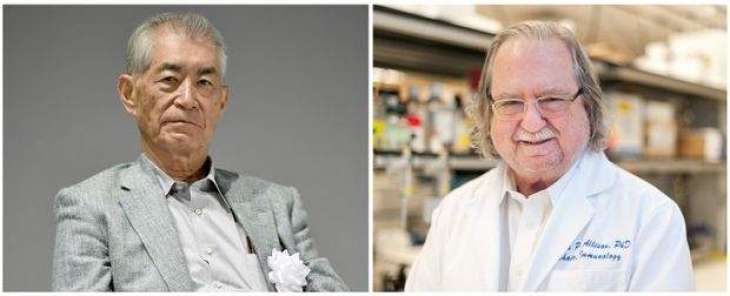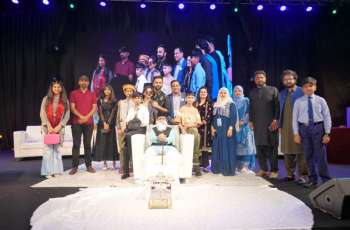The 2018 Nobel Prize in physiology or medicine was awarded to Japanese scientist Tasuku Honjo and US cancer immunotherapy specialist James Allison on Monday for their discovery of cancer therapy by inhibition of negative immune regulation.
MOSCOW (Pakistan Point News / Sputnik - 01st October, 2018) The 2018 Nobel prize in physiology or medicine was awarded to Japanese scientist Tasuku Honjo and US cancer immunotherapy specialist James Allison on Monday for their discovery of cancer therapy by inhibition of negative immune regulation.
Honjo was born in the Japanese city of Kyoto on January 27, 1942, and graduated from the Kyoto University Faculty of Medicine, obtaining a doctoral degree of medicine in 1966.
He earned a Ph. D. in Medical Chemistry in 1975.
In 1971-1973, he worked at the Department of Embryology at the Carnegie Institute in Washington.
From 1973 to 1974, he was a visiting researcher, employee of the US National Institute of Child Health and Human Development.
In 1974-1979, Honjo was an associate professor at the Faculty of Medicine of the University of Tokyo.
In 1979-1984, he worked as a professor of the school of Medicine at the University of Osaka.
In 1984-2005, he was a professor of Kyoto University Faculty of Medicine.
In 1996-2000 and 2002-2004, he served as dean of the medical faculty of the Higher School of Medicine, Kyoto University.
Since 2005, he was a professor at the Higher School of Medicine of the Kyoto University.
In 2006-2017, Honjo was a visiting professor at Kyoto University.
He was an executive member of the science and technology policy council of the cabinet of Japanese ministers in 2006-2012.
In 2012-2017, he was a chairman of the board of directors of Shizuoka Prefectural University Corporation.
He became a president of the Fund for Biomedical Research and Innovation in 2015 and an honorary professor of Kyoto University in 2017.
Tasuku Honjo is known for his work on the molecular identification of cytokines. Honjo discovered a protein on immune cells and found out that it operates as a "brake," preventing the tumor from developing. This discovery proved to be effective in the cancer treatment.
On October 1, 2018, Tasuku Honjo was awarded the Nobel Prize in Medicine for a new method of cancer immunotherapy.
Among the numerous awards received by Honjo are: the Asahi Prize (1982), the Imperial Prize of the Japan academy of Sciences (1996), the Robert Koch Prize (2012), the William B. Coley Award (2014), and the Japanese Order of Culture (2013).
US cancer immunotherapy specialist James Allison was born on August 7, 1948 in Alice, Texas.
In 1969, he received a bachelor's degree in microbiology, and in 1973, he earned a Ph.D. in biological sciences from the University of Texas at Austin.
From 1974 to 1977, he was a doctoral student at the Scripps Clinic and Research Foundation.
He worked at the University of Texas System Cancer Center in Smithville, Texas in 1977-1984.
In 1985-2004, he was a professor at the Cancer Research Laboratory at the University of California at Berkeley. In 1995, Allison studied the T-cell protein CTLA-4, which acts as an inhibitor (suppressor) for T cells. In 1996, a team of scientists under his leadership developed a new medicine, with which scientists were able to suppress several types of cancer in mice.
From 1997 to 2004, James Allison was an Associate Professor at the University of California. In 2004, Allison moved to the Memorial Sloan Kettering Cancer Center in New York to take part in the study.
From 1997 to 2012, he was a researcher at the Howard Hughes Medical Institute.
From 2012 - present, he has been a professor at the University of Texas Cancer Center.
On October 1, 2018, James Allison, along with Tasuku Honjo received the Nobel Prize in Medicine for developing a cancer immunotherapy method.
He wrote over 250 articles which were published in leading scientific journals and received numerous awards, including the Gairdner International Award (2014), the Harvey Prize (2015), the Lasker Award (2015), the Wolf Prize in Medicine (2017).




